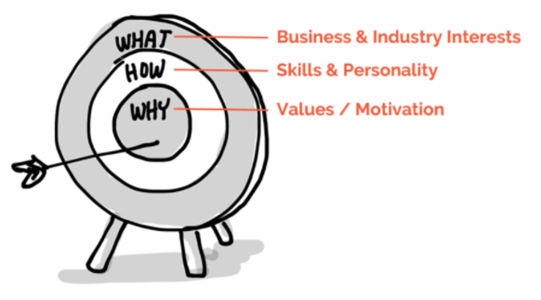In the context of finding co-founders, the “why” is someone’s values or motivations for starting a company. The best co-founding teams have similar drives for starting something, and this plays out in their decisions throughout the company – the types of customers they choose to target, the way they solve the needs of those customers, how they extract value from what they’ve created, their growth plans, etc. Some examples of these types of motivating factors might be to serve and make an impact, being driven by entrepreneurial creativity and innovation, loving a challenge, wanting to be an expert, reward, stability, or many others.Motivational compatibility does not guarantee success, but incompatibility is asking for trouble. If one person is driven by creating some innovative and cool, and another person is driven by the social impact, and yet another is driven financially, there will be challenging decision making down the line for the company. You want there to be constructive debate within the company, but not on the fundamental values – this is where you should have alignment.
How: Skills / Personality
Next, “how” is also sometimes known as the strategy you will use to achieve your “why.” In the context of your team, this is your mix of skills, and in the ideal founding team, these are complementary skills so that you can each of distinct roles that will not be overlapping, so that you can each trust one another and have full accountability within your domain. Depending on the type of company being formed, an early stage startup should typically have three types: the hacker, hustler, and designer. The hacker is essentially the product developer, the designer is the marketer, brander, and visual design person, and the hustler is the sales and business person. All three people play a lot of cross functional roles and may shift across the boundaries as the startup evolves, though having this in mind as a starting point can be helpful. The mistake many first time entrepreneurs make is forming a company of people just like them – all hustlers, or all hackers – since this is who they know or who has similar interests. When there is too much overlap in skills and ideas, some of the people just end up being implementers and this can become frustrating and disengaging, which can be challenging for the morale of the startup overall. The proper team setup is important to avoid this.
I also suggest researching complementary personality types, where some aspects of MBTI can be valuable, plus for MIT Launch we use OCEAN (openness, conscientiousness, extraversion, agreeableness, and neuroticism), to better understand potential team dynamics. The key here with personality comes down to setting expectations and ensuring open communication. I also suggest having a look at the five dysfunctions of a team and potential ways to avoid these.
Once you’ve aligned with potential co-founders around common values and with complementary skills, it becomes surprisingly easier to find common ground to find business ideas. Whether you already have an idea that you are trying to find co-founders to join, or want to start something new, you will be able to get a potential co-founder to engage on a deeper level if you have them connect with what is motivating them to be a part of a startup in the first place, which will benefit you, them, and your startup greatly in the long run.Other Considerations
Although many aspiring entrepreneurs are tempted to start a company with a best friend or family member, these are actually the least stable. They tend to have a 6-month honeymoon period, but some difficult discussions tend to be avoided, which can end in disaster. Data by Noam Wasserman of over 10,000 startups shows that companies with co-founders of this type have much lower stability over time. Everyone wants to believe they’re different, and point to exceptions, but these statistics exist for a reason. Understand them and choose your battles – you’ll be fighting enough of them as an entrepreneur!
Good luck in your hunt for the perfect team.





Really insightful and useful. I found the tips very practical. Great write up!
Brilliant advise i have taken it.Choosing the right team in business is a great idea, thank you so much.
After rode it, it seems i will redesign my team by adding some persons. thank for these advices!
Great information for solid foundation.
Yes. I agree. It’s an excellent course. very exciting.
to be a successful in business industry. Right team is essential!!!
Thank you for a useful information!
Very good article : defining “TEAM” in term of purpose, location, and organizational structure
Fantastic input. Perfect ideas to form successful teams.
Very nice and informative article.
A lot of great insights about business startups.
i have been equipped with business knowledge
thank you
Without like minded team, it will be difficult to do something good
I want to built good team with like minded peoples.
Interesting to read
picking right team for business is necessary
In any new startup good idea, strong foundation, strong team, well experience, good advice and decision is important for new entrepreneur as per my knowledge.
We have to make – design strong team for success in new startup. I will accept this advice.
I´m not sure that starting a company with a family member, increase the failure possibility. I think values and skills are the most important things. Even though, it´s a weakness that you have to considerer.
VALUABLE INSIGHTS TO FIND THE RIGHT TEAM
This is a little confusing. I cannot use my family member or best friend as partner for the given reasons. That leaves me to go with a complete stranger. How I gain trust particularly when I am putting my hundred percent resources in to the startup?
Great question. The important thing is to have seen and/or worked with the person in a professional capacity, so that you know how you might work together. This is rarely the case for family or friends, though would be the case for fellow employees at a company, or people you have worked on projects with in school.
Very helpful.